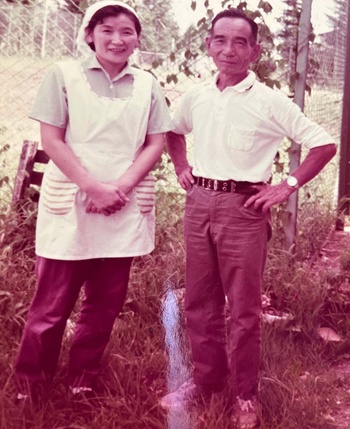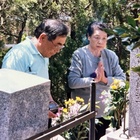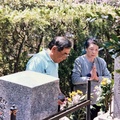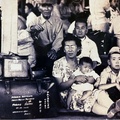Memories of Their Mother May
After being joined by John and the girls in Kyoto, May continued working as a simultaneous interpreter, translator, and typist at various bases. It seems she was exceptionally skillful as a simultaneous interpreter and could switch seamlessly between English and Japanese. Megumi recalls hearing from May that she had won first prize in several simultaneous interpretation contests held at her workplace. She did well financially as long as the bases remained open.
However, her employment there came to a close when the occupation ended and she subsequently went through a period of economic hardship. At some point around this time John divorced her and left her and the daughters. He remarried and had a third daughter, Junko. May also eventually remarried briefly and had a second son named Katsumi. Her daughters recall her being an extremely hard worker who endured her hardships with fortitude. Megumi explains about this period of May’s life and speculates about possible causes for the divorce as follows:
She was together with us and we endured all our hardships together, always, until she died, right until the end...She was working endlessly from when we first came to Japan from Canada. Things were good when she was employed in the occupation forces camps. There was a big camp at what is now Shimazu Seisakujo (in Kyoto)... We moved from Wakayama to a place close to it. At that time, all four of us lived together...
Father was working as boiler man at the occupation forces camp. Mother was working as a simultaneous interpreter and a typist. After that she worked at the camp at Otsu, then the camp at Uji. We moved around to various places. Then Father left and mother was alone.... [Soon] that employment [for the occupation forces] disappeared, so she did various kinds of work...she worked as a door-to-door insurance salesperson, did embroidery—she was skilled with her hands, so she did some work for an embroidery company.
She was lonely, I think, but she had a relatively calm and optimistic personality. And she was quite tolerant. She endured hardship, when you consider how Father used to go out drinking and so on. I wonder if we had stayed in Canada things would not have turned out this way. After the war ended, everyone became a little strange. After they came to Japan, something (in their relationship) changed away from normal.
In addition to being a hard worker, May also was known for having strong compassion for others and a sense of social justice. Apparently she was fired from one of her part time jobs because she spoke up on behalf of other workers who were being treated unjustly.
Megumi also remembers occasionally attending church with her mother as a child although May’s activities as a Christian became more sporadic later in her life. She particularly recalls May taking her to a church on a street corner in Kitadairo in Kyoto, though she does not recall whether it was Anglican like her church in Canada. Many years later Megumi attended the Japanese Anglican church in Vancouver while visiting Basil and recognized the melodies of some of the songs because as a child she had heard them being sung by her mother and at church.
May visited Canada twice and stayed with Basil’s family in Vancouver, once in the mid-seventies and again around 1985. While there she expressed her wish to stay in Canada, but according to Basil the family decided against it as she also had family members (and particularly grandchildren) in Japan, and they worried she would change her mind and decide to again move to Japan, so it seems she gave up on the idea. On September 16, 1991, she passed away in her sleep at the age of 76.
Memories of Their Father John
John’s daughters have various memories of his very active life. From their earliest childhood they were impressed by his athleticism and competitive spirit. Emiko recalls him doing various kinds of competitive sports such as swimming and wrestling and telling the girls how important it is to be able to protect oneself. She says, “He told us that, from when he was small, he got into quarrels with people from various countries, and he won. He entered swimming meets and didn’t lose—At least, he said so!” She also remembers seeing him doing bar gymnastic exercises when she was in elementary school, and he continued to do so at least into his fifties.
After the American military bases closed and John lost his employment there, he was hired as a custodian by Kyoto Notre Dame University where he continued working for the rest of his life.
His daughters recall him doing various kinds of work at the university. Emiko explains, “He was a boilerman, and he could do simultaneous interpretation. Around that time the chef and some other employees at Notre Dame were foreigners, and he was qualified to be an interpreter.... He (also) worked with garden shrubs and plants, caring for animals, and things like that, kind of like a custodian.” Junko adds, “Notre Dame University moved from Shishigatani to where it is now (Sakyo-ku). When it moved, Father planted all the trees one by one. Nowadays they would use an outside contractor for many of the jobs such as painting...but he did all of that.”
Apparently he was in high demand at the university due to his various job skills. Junko recalls:
At that time, Father was the only person at the university who carried a calling bell in case they didn’t know where he was...He always carried the bell. If there was some matter needing attention, they would ask, “Where is Izumi san?” and would try to find him. He was a really hard worker. He kept working well past retirement age.... He was kind toward people, kind to animals. When he took trips far away, he would be called back, for example, to take care of a sick cat. He would even get phone calls while on holiday in Wakayama. He was that kind of person.... He died when he was 73, I think. But he kept working right up to the end.
As noted above, John had divorced May not long after moving to Kyoto to join her and his daughters, remarried, and had another daughter, Junko. Interestingly, Megumi and Emiko noticed a significant change in his personality following the divorce. Megumi recalls:
I don’t know if it was because he felt guilty after separating from Mother, but he was kind—after the divorce. Before then, he was short-tempered. They divorced before I entered elementary school, I think. He often came to meet us. Each year on August 16 there is the Daimonji Okuribi Festival in Kyoto. At that time, there was a certain place—we knew that if we went to a certain bridge we could meet him. Without fail he would come there on the 16th. He would look for us while we were watching the burning letters. I remember it, every year. And, as we got older, he often came to our house.
Junko explains how he continued to work even after being diagnosed with terminal cancer:
After surgery, he recovered; however, the cancer came back...[but] to the very end he rode to work on his bicycle, his bicycle! The distance to the school was very far. At the end he lived in Saga, which is at the very west edge [of Kyoto]. Even from there he would ride his bicycle all the way to Sakyoku. He really paid attention to his health. He himself never thought that he would die that way. He said that he would be okay because he had trained his legs by mountain climbing and other kinds of exercise.
As in the case of May, it is not clear to what degree John continued to practice his Anglican faith after returning to Japan. It appears that he became a practicing Catholic while at Notre Dame, a Catholic university. Yet, the woman he remarried was a practicing Zen Buddhist, and it seems that he was also strongly influenced by her beliefs. Junko recalls the following banter between him and her mother (his second wife):
My mother was Buddhist, a Zen Buddhist. At the end, when he was old, partly in jest she would say, “Will your funeral be in a church or a temple? Do you want a Japanese [or western] ceremony?” He replied, “Either is OK.” He used to say, “All religions are the same. Let’s respect the ancestors. All the religions say similar good things.”
In 1983, at the age of 73, John passed away. His funeral was conducted in a typical Zen Buddhist manner by a priest at Tenryu Temple in Arashiyama but was attended by many Catholic nuns from Notre Dame University. The importance of the role that he had played at Notre Dame was demonstrated by the principal, Sister Beatrice, setting up a picture of him and holding a memorial service for him every Easter.
© 2021 Stan Kirk












